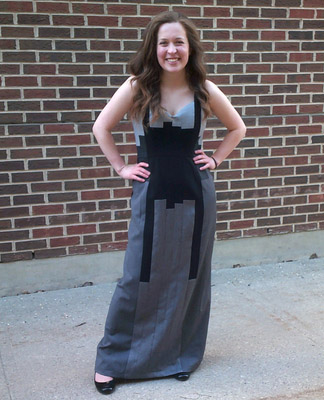
Quinn Falconar has taken her love of thrifting to a whole new level. By taking suits she scavenged at a thrift store and recycling it, she graduates this June $1,000 richer.
Falconer, who just completed the fourth year of a combined degree in both education and human ecology, was awarded the Télio Scholarship for her city skyline-inspired gown and handbag created from this upcycled material. The dress was pieced together from more than 40 strips of fabric, which served both aesthetic and practical purposes; the lines of the cityscape motif correspond with the style lines of the dress that create a perfect fit.
"It has quite a lot of interesting ideas and design levels without being visually loud," said Vlada Blinova, a professor in the Department of Human Ecology who helped Falconar problem-solve when the pattern pieces could not be used as initially intended with the recycled clothing. "Subtlety is a very high-skill in design and this garment cleverly allows the craftsmanship and details to shine though." Using such small pieces made for a complex pattern but Falconar's design created a large garment from smaller ones without sacrificing the flow and grace of the dress.
Undergraduate students in the Department of Human Ecology's clothing, textile and material culture program had the opportunity to submit garments they designed for the scholarship. The garments were constructed from recycled textiles and had to be complemented by an original accessory.
Falconar has been sewing for years but this was the first time she had not used a commercially produced pattern. Given the complexity of her design, it was "a bit of a difficult learning experience" said Falconar. "Seeing the end result of this project made the effort very much worthwhile."
"I am very grateful that scholarships such as the Télio Scholarship acknowledge the efforts of this hands-on learning."
Télio Fabrics is one of the largest manufacturers and distributers of fashion textiles in Canada. They have a long history of awarding scholarships to post-secondary students in fashion design programs. In the past University of Alberta students have completed and won national competitions held by Télio but students now complete within their institution. The department's submissions were judged by faculty members Jane Batcheller, Kathryn Chandler and Lori Moran alongside local fashion designer Marianne Scott.
"I think their support of young Canadian designs and talent is very important," said Blinova, who teaches apparel design and construction courses in the department. She says the Department of Human Ecology is included as one of the competition sites because of the strength of the clothing, textile and material culture program.
As for Falconar, the recognition received with this award has given her confidence to continue incorporating sustainable design into her practice. Looking forward to a career as a human ecology educator she said, "I would love to continue to teach the message of environmental responsibility and preparing students to be responsible consumers." She plans to use her scholarship to partially fund the final year of her combined degree.
The dress is on display in the Human Ecology Gallery until September 30, 2018, as part of the "re-Vision and re-Turn: exploring sustainable fashion" exhibit.